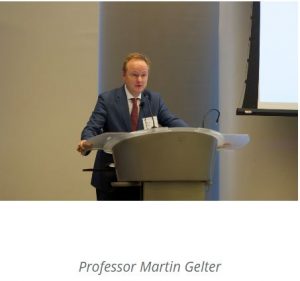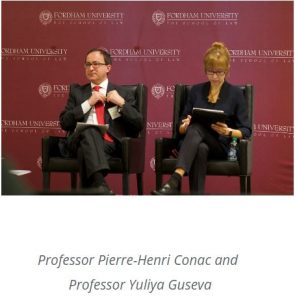Symposia
2023 Symposium
A Major Question for the SEC: Analyzing Constitutional Limits on Regulatory Authority
Friday, October 27, 2023 |1:00 p.m. to 5:30 p.m.
Fordham Law School
Constantino Room, Second Floor
150 West 62nd Street
2022 Symposium
The Battle with Big Tech: Analyzing Antitrust Enforcement and Proposed Reforms
Friday, November 4, 2022 |1:00 p.m. to 5:30 p.m.
Fordham Law School
Constantino Room, Second Floor
150 West 62nd Street
2020 Symposium
Who Makes ESG? Understanding Stakeholders in the ESG Debate
Friday, October 23, 2020
SPEAKERS ON PANEL 1:
Stephanie Betts, Investment Specialist, M&G Investments
Lorenzo Corte, Partner, Skadden, Arps, Slate, Meagher & Flom LLP
David M. Silk, Partner, Wachtell, Lipton, Rosen & Katz
Scott V. Simpson, Partner, Skadden, Arps, Slate, Meagher & Flom LLP
SPEAKERS ON PANEL 2:
Professor Lisa M. Fairfax, Professor of Law, University of Pennsylvania Carey Law School
Carmen X.W. Lu, Associate, Wachtell, Lipton, Rosen & Katz
Professor David H. Webber, Professor of Law, Boston University School of Law
FIRESIDE CHAT:
Leo E. Strine, Jr., Of Counsel, Wachtell, Lipton, Rosen & Katz
Professor Sean J. Griffith, T.J. Maloney Chair and Professor of Law, Fordham Law School
Symposium: Who Makes ESG? Understanding Stakeholders in the ESG Debate
2019 Symposium
Global Investor Protection: Securities Law Enforcement Around the World
Friday, October 18, 2019
When investors and the securities markets suffer as a result of misrepresentations, fraud, and other violations of law, they seek private and public enforcement across different jurisdictions. This year’s Symposium featured leading securities law practitioners, academics, and government officials from the United States, Central America, and Europe, as they discussed the comparative advantages of private and public enforcement and the effectiveness of regulatory systems in different jurisdictions.
First Panel:


The first panel featured practitioners and scholars with a focus on international securities litigation. These panelists discussed several critical topics, including a comparison of private and public enforcement, the growing prevalence of litigation by the U.S. Securities and Exchange Commission (“SEC”), policy concerns surrounding securities class actions against foreign issuers, and the promises and challenges of Mexico as a case study for investor protection in global capital markets.
Second Panel:


The second panel featured practitioners and scholars with experience in the United States and European regulatory systems. These panelists discussed various issues, such as: the differences between the European Union and U.S. public enforcement systems and the risk of jurisdictional competition, competing regulatory interests and creative alternatives to private enforcement, trends and dynamic of SEC enforcement post United States v. Morrison, and practice experience regarding classification and foreign investors.
Fireside Chat:

Commissioner Elad L. Roisman and Professor Sean J. Griffith
The Symposium concluded with a fireside chat between SEC Commissioner Elad L. Roisman and Fordham Professor Sean J. Griffith. Mr. Roisman and Professor Griffith exchanged their thoughts on the complexity of proxy voting and the involvement of funds, the different fiduciary duties owed to funds and corporations, the issue of proxy advisory, and the United Nations’ Principles for Responsible Investment.
SPEAKERS ON PANEL 1:
Eugenio J. Cárdenas, Associate, Kirkland & Ellis LLP
Professor Merritt B. Fox, Michael E. Patterson Professor of Law, Columbia Law School
Professor Martin Gelter, Professor of Law, Fordham Law School
Geoffrey Jarvis, Partner, Kessler Topaz Meltzer & Check, LLP
SPEAKERS ON PANEL 2:
Professor Pierre-Henri Conac, Professor of Commercial and Company Law, University of Luxembourg
Todd G. Cosenza, Partner, Willkie Farr & Gallagher LLP
Professor Jill E. Fisch, Saul A. Fox Distinguished Professor of Business Law, University of Pennsylvania Law School
Professor Yuliya Guseva, Professor of Law, Rutgers Law School
FIRESIDE CHAT:
Elad L. Roisman, Commissioner, U.S. Securities and Exchange Commission
Professor Sean J. Griffith, T.J. Maloney Chair and Professor of Law, Fordham Law School
__________________________________________________________________________________________
2018 Symposium
The Future of the New International Tax Regime
Friday, October 26, 2018
The new tax regime established by the Tax Cuts and Jobs Act of 2017 (“TCJA”) made sweeping changes to the international taxation framework. This Symposium featured the nation’s leading legal and economic experts on international taxation, as they discussed the repercussions of the TCJA. The event began with a keynote address by Rosanne Altshuler, Professor of Economics at Rutgers University, entitled “Why I’m Guilty of Liking the GILTI: The Case for a Minimum Tax on Low-Taxed Foreign Income.”
The first panel featured five international tax legal experts. The panelists discussed numerous topics such as: international profit shifting, reforming international tax treatises, taxing “where sold” vs. “where originated,” the Base Erosion Anti-Abuse Tax Provision (“BEAT”), the Global Intangible Low-Taxed Income (“GILTI”), the worldwide vs. territorial tax framework, and the reliability of U.S. Treasury Department tax guidelines clarifying the new allocation and deduction rules.
The second panel featured practitioners with experience in policy, practice, and academia. These panelists discussed various issues such as: the weaknesses in the lack of earnings and profits test under GILTI, the current trend of aggressive taxation of foreign corporations, a comparison of the current international tax policy to the Obama Administration’s prior tax reform proposal, and a proposal to fix the “broken” international tax code.
The Symposium concluded with closing remarks from Steven Dean, Vice Dean of Brooklyn Law School. Mr. Dean expressed his enthusiasm for the dynamic nature of tax law and policy and highlighted the many job opportunities that now exist in the tax field. These opportunities will only grow as experts continue to learn about the repercussions of the new international tax regime.
KEYNOTE SPEAKER: Profession Rosanne Altshuler, Professor of Economics at Rutgers University
SPEAKERS OF PANEL 1:
Professor Daniel N. Shaviro, Wayne Perry Professor of Taxation at New York University
Professor Susan C. Morse, Angus G. Wynne, Sr. Professor in Civil Jurisprudence, The University of Texas at Austin School of Law
Professor Michael Gaetz,Wilbur H. Friedman Professor of Tax Law and the Columbia Alumni Professor of Tax Law at Columbia Law School
Professor Fadi Sheehan, Associate Professor of Law and Professor Charles Davenport Scholar, Rutgers Law SchoolSPEAKERS OF PANEL 2:
Stephen E. Shay, Senior Lecturer, Harvard Law School; Retired Partner & Consultant, Ropes and Gray
Danielle Rolfes, Former International Tax Counsel, KPMG Washington, D.C
Richard Phillips, Senior Policy Analyst, Institute on Taxation and Economic PolicyCLOSING REMARKS:

__________________________________________________________________________________________
2017 Symposium
What Would We Do Without Them: Whistleblowers in the Era of Sarbanes-Oxley and Dodd-Frank
Friday, October 27, 2017
When employees engage in misconduct and illegal activity in the workplace, whistleblowers must be encouraged to speak up. Whistleblowers protect the integrity of the U.S. financial system and ensure that employees adhere to ethical standards. But in doing so, whistleblowers may face backlash from their fellow colleagues, bosses, and upper management. As a result, legal protections must be in place to protect and support whistleblowers.
This Symposium discussed one such safeguard taken up the U.S. Securities and Exchange Commission (“SEC”). This whistleblower program, which was authorized by Congress, allows the SEC to give monetary awards to those who report illegal conduct in their company.
The Symposium featured a keynote speech from Ms. Jane Norberg, who heads the Office of the Whistleblower at the SEC, and included an in-depth panel discussion that addressed both the successes and the shortcomings of corporate whistleblowing. The panelists were drawn from a broad range of careers within the public and private sectors, and included SEC employees, private practitioners and law professors, each of whom brought a diverse perspective on contemporary whistleblowing.
KEYNOTE SPEAKER: Jane Norberg, Chief of the Office of the Whistleblower, SEC
SPEAKERS:
Tracey McNeil ’99, Ombudsman, SEC
Jennifer Pacella, Assistant Professor of Law, Zicklin School of Business
Timothy Shore ’85, Vice President & Chief Ombudsman, Pfizer
Judith Weinstock, Assistant Director, SEC New York Regional Office
Jason Zuckerman, Whistleblower Retaliation & Award Attorney

__________________________________________________________________________________________
2016 Symposium
Friday, October 21, 2016
The tern political corruption broadly captures any abuse of entrusted power by government officials for private gain. As history demonstrates, the world has not been shortchanged of bad actors willing to facilitate corruption, particularly through the provision and receipt of bribes. The massive and odious problem of corruption is found in the U.S. and virtually every other nation in the world. Defining political corruption is complex and there are many competing viewpoints posited by scholars and professionals. The recent Supreme Court ruling in McDonnell v. United States significantly narrowed what qualifies as an “official act” by a public official in the U.S., curtailing the power of federal bribery laws.
Corruption in political finance is also a growing concern in the U.S. as demonstrated by heightened scrutiny over political donations made by financial institutions and the ethical issues surrounding the Clinton Foundation. The severity of the problem extends and intensifies abroad. Since its passage, the Foreign Corrupt Practices Act of 1977 has evolved and significantly influenced corporate and business practices across the globe. Corruption was recently brought to the international forefront, implicating hundreds of high-profile private and public individuals and institutions, with the U.S. Department of Justice’s FIFA-related indictments alleging systemic and widespread corruption and the colossal Panama Papers data leak.
This Symposium aimed to foster a meaningful dialogue concerning the history, present state, and future of federal and foreign anti-corruption and anti-bribery laws. Our panel of leading scholars and prominent practitioners assessed what the future holds for companies conducting business abroad and analyzed the effects of recent U.S. and international corruption rulings, investigations, and scandals.
SPEAKERS
Zachary S. Brez, Partner and Co-chair of the Business & Securities Litigation Practice, Ropes & Gray LLP
Michael J. Cohn, Global Chief Compliance Officer and Deputy General Counsel, Fortress Investment Group LLC
Professor Sean J. Griffith, T. J. Maloney Chair in Business Law and Director of the Corporate Law Center, Fordham Law School
Professor Susan Rose-Ackerman, Henry R. Luce Professor of Jurisprudence (Law and Political Science), Yale University
Timothy J. Treanor, Partner and Global Co-leader of the White Collar Criminal Defense and Investigations Practice, Sidley Austin LLP

__________________________________________________________________________________________
2015 Symposium
Are We Ready for the Next Financial Crisis?
Friday, October 30, 2015
Inspired by the forthcoming book Getting Ready for the Next Bailouts (Columbia University Press, 2016) by Fordham Law Professor Richard Squire, this symposium examined the narrative of the recent U.S. financial crises, changes in the regulatory landscape, and facts and myths about bailouts and their role in the U.S. economy.
KEYNOTE SPEAKER
Daniel M. Gallagher, Jr.
Former Commissioner, U.S. Securities and Exchange Commission
SPEAKERS
Eric F. Grossman
Executive VP & Chief Legal Officer, Morgan Stanley
Richard K. Kim
Partner, Wachtell, Lipton, Rosen & Katz
Richard Squire
Professor of Law, Fordham Law School

Keynote Speaker Daniel M. Gallagher, Jr., Former Commissioner of the U.S. Securities and Exchange Commission

Panelists Richard K. Kim (Partner, Wachtell, Lipton, Rosen & Katz), Eric F. Grossman (Executive VP & Chief Legal Officer, Morgan Stanely), and Richard Squire (Professor of Law, Fordham Law School)
